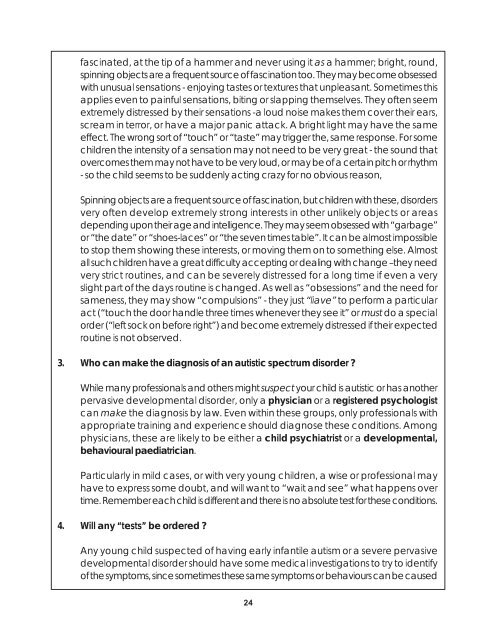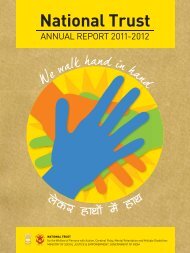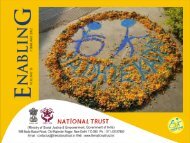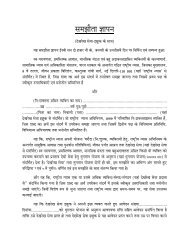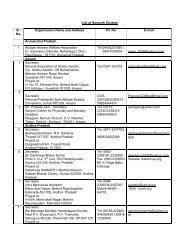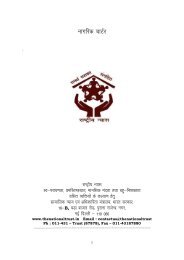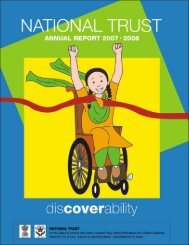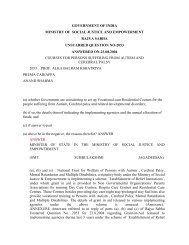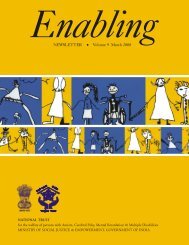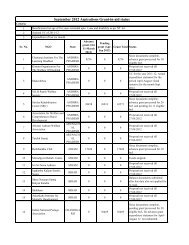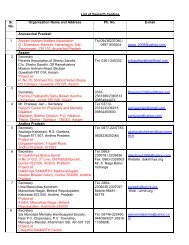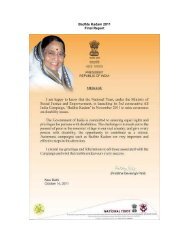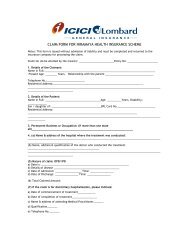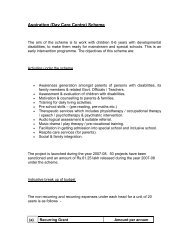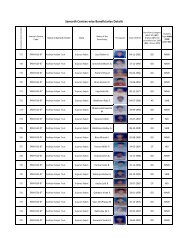INTRODUCTION - National Trust
INTRODUCTION - National Trust
INTRODUCTION - National Trust
Create successful ePaper yourself
Turn your PDF publications into a flip-book with our unique Google optimized e-Paper software.
fascinated, at the tip of a hammer and never using it as a hammer; bright, round,<br />
spinning objects are a frequent source of fascination too. They may become obsessed<br />
with unusual sensations - enjoying tastes or textures that unpleasant. Sometimes this<br />
applies even to painful sensations, biting or slapping themselves. They often seem<br />
extremely distressed by their sensations -a loud noise makes them cover their ears,<br />
scream in terror, or have a major panic attack. A bright light may have the same<br />
effect. The wrong sort of “touch” or “taste” may trigger the, same response. For some<br />
children the intensity of a sensation may not need to be very great - the sound that<br />
overcomes them may not have to be very loud, or may be of a certain pitch or rhythm<br />
- so the child seems to be suddenly acting crazy for no obvious reason,<br />
Spinning objects are a frequent source of fascination, but children with these, disorders<br />
very often develop extremely strong interests in other unlikely objects or areas<br />
depending upon their age and intelligence. They may seem obsessed with “garbage”<br />
or “the date” or “shoes-laces” or “the seven times table”. It can be almost impossible<br />
to stop them showing these interests, or moving them on to something else. Almost<br />
all such children have a great difficulty accepting or dealing with change –they need<br />
very strict routines, and can be severely distressed for a long time if even a very<br />
slight part of the days routine is changed. As well as “obsessions” and the need for<br />
sameness, they may show “compulsions” - they just “liave” to perform a particular<br />
act (“touch the door handle three times whenever they see it” or must do a special<br />
order (“left sock on before right”) and become extremely distressed if their expected<br />
routine is not observed.<br />
3. Who can make the diagnosis of an autistic spectrum disorder ?<br />
While many professionals and others might suspect your child is autistic or has another<br />
pervasive developmental disorder, only a physician or a registered psychologist<br />
can make the diagnosis by law. Even within these groups, only professionals with<br />
appropriate training and experience should diagnose these conditions. Among<br />
physicians, these are likely to be either a child psychiatrist or a developmental,<br />
behavioural paediatrician.<br />
Particularly in mild cases, or with very young children, a wise or professional may<br />
have to express some doubt, and will want to “wait and see” what happens over<br />
time. Remember each child is different and there is no absolute test for these conditions.<br />
4. Will any “tests” be ordered ?<br />
Any young child suspected of having early infantile autism or a severe pervasive<br />
developmental disorder should have some medical investigations to try to identify<br />
of the symptoms, since sometimes these same symptoms or behaviours can be caused<br />
24


